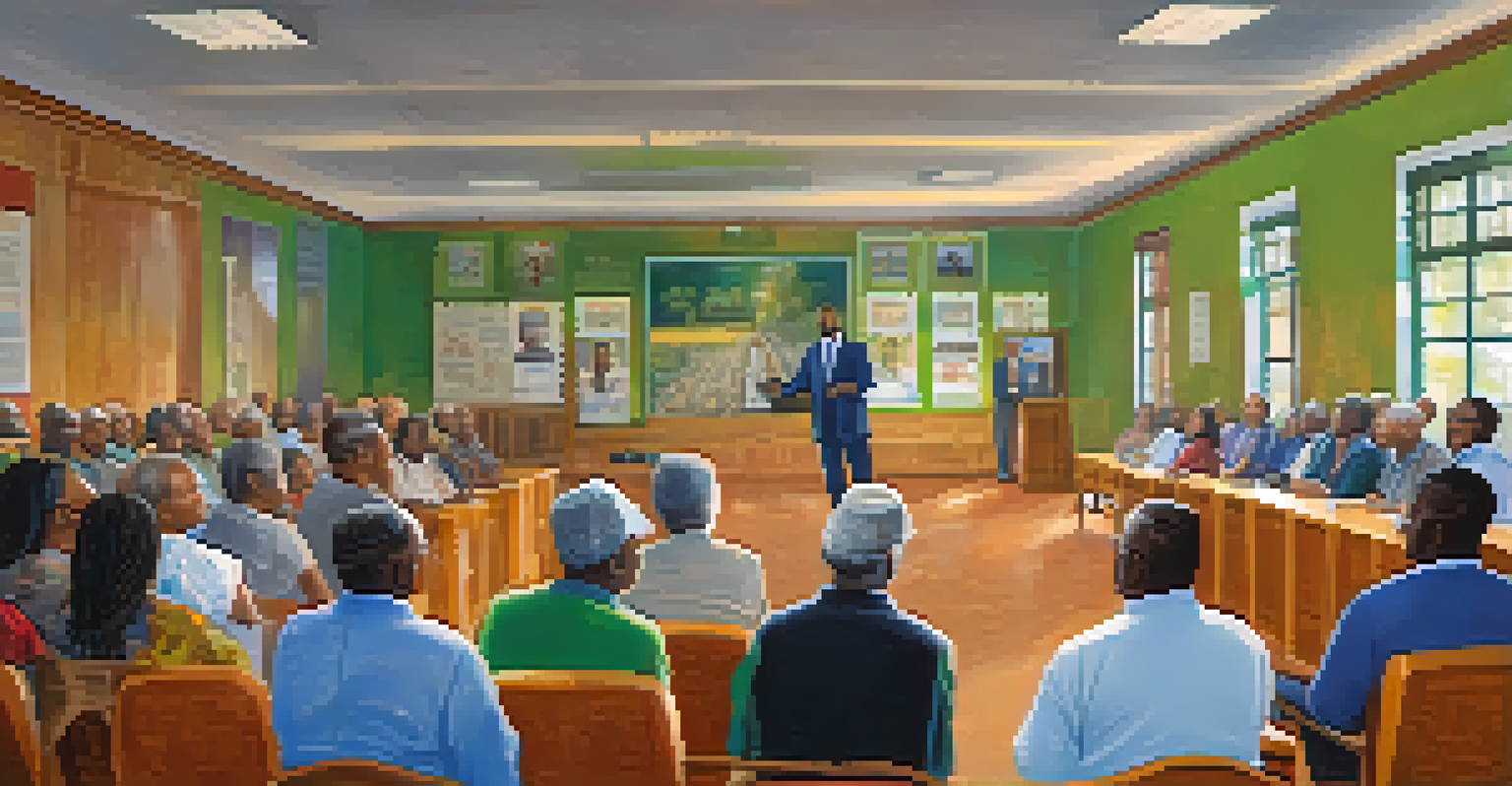Community Engagement: Leaders Making a Difference in Recovery

Understanding Community Engagement in Recovery Efforts
Community engagement is the process of involving local residents in decision-making and initiatives that affect their lives. In the context of recovery, this means bringing together individuals, organizations, and leaders to foster a supportive environment. It's about creating a space where voices are heard and every participant feels valued, leading to more effective recovery strategies.
Alone we can do so little; together we can do so much.
By actively engaging communities, leaders can better understand the unique challenges faced by individuals seeking recovery. This approach allows for tailored solutions that address specific needs, enhancing the overall effectiveness of recovery programs. For instance, a community-led initiative might identify gaps in mental health resources, prompting targeted support that can make a real difference.
Moreover, community engagement can break down the stigma often associated with recovery. When leaders foster open conversations and share personal stories, they create a culture of acceptance. This not only encourages individuals to seek help but also builds a network of support that is crucial for long-term recovery.
The Role of Local Leaders in Fostering Recovery
Local leaders play a pivotal role in shaping recovery initiatives within their communities. They often serve as the bridge between individuals in need and the resources available to them. By advocating for recovery services and promoting awareness, these leaders can significantly impact the lives of those struggling with addiction or mental health issues.

For example, a mayor might partner with local health organizations to create a recovery task force, ensuring that resources are allocated efficiently. This collaborative approach not only brings visibility to the issue but also fosters a sense of community ownership over recovery efforts. When leaders take tangible steps, it inspires others to get involved and contribute.
Community Engagement Drives Recovery
Involving local residents in decision-making creates supportive environments that enhance recovery strategies.
Furthermore, effective local leadership can mobilize volunteers and community members to participate in recovery initiatives. This grassroots involvement creates a powerful support network, where people can share their experiences and learn from one another. Together, they can advocate for policy changes and better resources, ultimately leading to sustained recovery efforts.
Building Partnerships: The Key to Successful Recovery Programs
Collaborative partnerships are crucial in the realm of community engagement and recovery. By connecting various stakeholders—such as healthcare providers, non-profits, and local businesses—leaders can create a robust support system. Each partner brings unique strengths and resources to the table, enhancing the effectiveness of recovery programs.
The greatest weapon against stress is our ability to choose one thought over another.
For instance, a local business might provide job training for individuals in recovery, while a healthcare provider offers counseling services. This holistic approach addresses multiple facets of recovery, ensuring that individuals receive comprehensive support. Leaders who foster such partnerships are instrumental in creating sustainable recovery ecosystems.
Additionally, these partnerships can amplify awareness and outreach efforts. When organizations work together, they can pool resources for marketing campaigns or community events that highlight available services. This increased visibility not only attracts more participants but also educates the community about the importance of recovery.
Engaging Youth in Recovery and Community Initiatives
Involving youth in community recovery efforts is essential for long-term success. Young people bring fresh perspectives and innovative ideas that can drive change. By engaging them in the planning and implementation of recovery initiatives, leaders can ensure that the programs are relevant and effective for the younger generation.
For example, youth-led organizations can create awareness campaigns that resonate with their peers. They might use social media platforms to share stories of recovery, breaking down barriers and encouraging others to seek help. This not only empowers young individuals but also creates a sense of belonging and support within the community.
Local Leaders Inspire Recovery Action
Effective local leadership mobilizes resources and community members, fostering a collaborative approach to recovery.
Moreover, providing opportunities for youth involvement fosters a culture of responsibility and leadership. When young people take an active role in recovery initiatives, they learn valuable skills that can benefit them in the future. Empowering the next generation is a critical investment in the community's overall health and resilience.
The Importance of Feedback in Community Recovery Efforts
Feedback is a vital component of community engagement and recovery initiatives. It allows leaders to assess the effectiveness of programs and make necessary adjustments. By actively seeking input from participants, leaders can identify what works and what doesn’t, ensuring that recovery efforts are continually improving.
For instance, hosting community forums or surveys can provide valuable insights into the needs of individuals in recovery. Participants can share their experiences and suggest changes, fostering a sense of ownership over the programs. This not only enhances the initiatives but also strengthens the relationship between leaders and the community.
Additionally, feedback creates accountability among leaders and organizations. When community members feel heard and see their suggestions implemented, it builds trust and encourages ongoing engagement. A feedback loop fosters a collaborative environment, where everyone is invested in the success of recovery efforts.
Success Stories: Transformative Community Engagement in Action
Success stories of community engagement in recovery can serve as powerful motivators for others. When individuals see tangible results from their collective efforts, it inspires hope and encourages further participation. These stories highlight the real impact that engaged communities can have on recovery outcomes.
For instance, a community that established a peer support program may share testimonials from individuals who found their path to recovery through these connections. These narratives not only celebrate achievements but also emphasize the importance of community support. They demonstrate how collaboration can lead to lasting change.
Partnerships Enhance Recovery Support
Collaborative efforts among stakeholders build comprehensive support systems that address diverse recovery needs.
Moreover, sharing success stories can attract new participants and resources. When communities showcase their accomplishments, it can draw the attention of potential partners and funders. This recognition can lead to expanded initiatives and greater support for recovery efforts, ultimately benefiting more individuals.
Looking Ahead: The Future of Community Engagement in Recovery
The future of community engagement in recovery looks promising as more leaders recognize its importance. Emerging trends, such as digital engagement and virtual support groups, are making recovery resources more accessible. These innovations can enhance participation, especially for those who may face barriers in traditional settings.
Moreover, as communities continue to advocate for recovery, there's a growing emphasis on inclusivity. Leaders are increasingly aware of the need to engage diverse populations, ensuring that everyone has a voice in recovery efforts. This commitment to inclusivity will strengthen community bonds and foster a wider range of support.

Ultimately, the ongoing dedication to community engagement will lead to more resilient and supportive environments for recovery. By prioritizing collaboration and open dialogue, leaders can help create a future where recovery is not only possible but celebrated within the community.